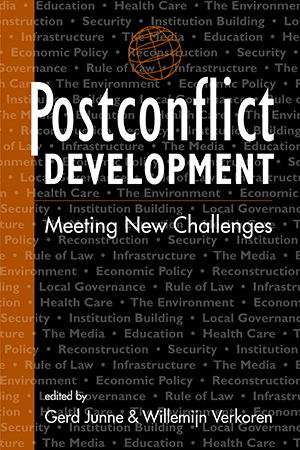
- 2004/371 pages
- A related title: Peacebuilding in Postconflict Societies: Strategy and Process by Ho-Won Jeong.
Postconflict Development:
Meeting New Challenges
Hardcover: $65.00
ISBN: 978-1-58826-327-8
Paperback: $27.50
ISBN: 978-1-58826-303-2
Ebook: $27.50
ISBN: 978-1-62637-165-1
With the proliferation of civil wars since the end of the Cold War, many developing countries now exist in a "postconflict" environment, posing enormous development challenges for the societies affected, as well as for international actors. Postconflict Development addresses these challenges in a range of vital sectors—security, justice, economic policy, education, the media, agriculture, health, and the environment in countries around the globe.
The authors focus on the need to move beyond emergency relief to create new social and economic structures that can serve as the foundations for a lasting peace. Prosperity, the authors acknowledge, does not guarantee peace; but a lack of economic development will almost certainly lead to renewed violence. This conviction informs their thorough discussion of the policy dilemmas confronted in postconflict situations and a range of concrete, successful approaches to resolving them.
No rights in South Asia







